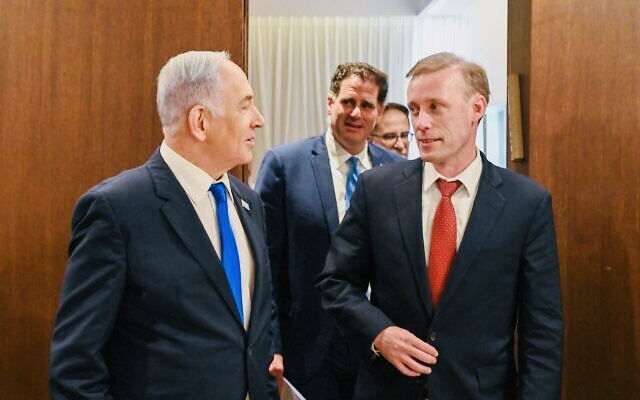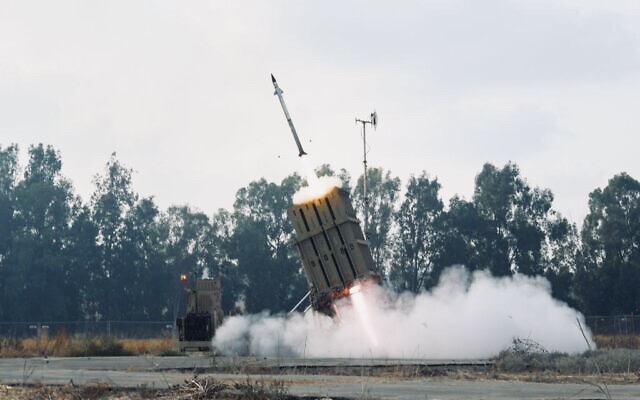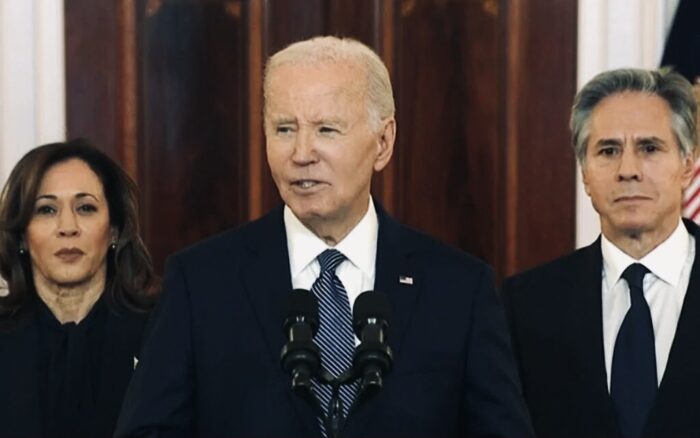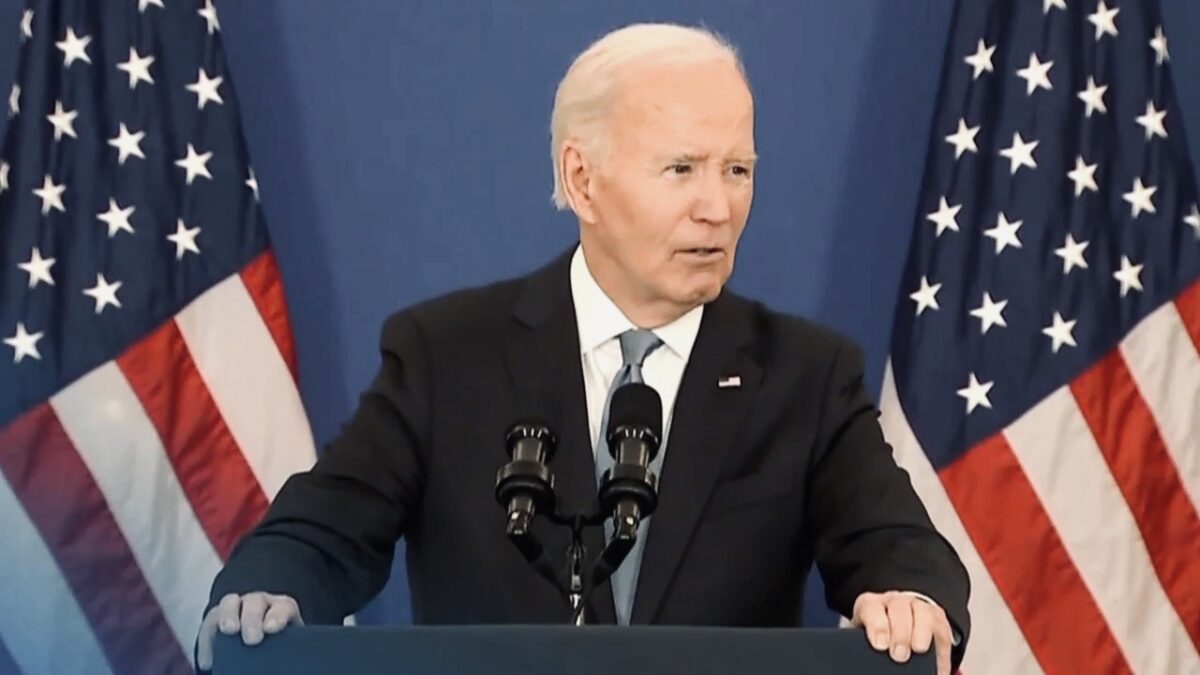In the final days of his four-year presidency of the United States, Joe Biden delivered a farewell speech defending his foreign policy legacy. Speaking at the State Department a week before President-elect Donald Trump returns to the White House for one more term, Biden boasted that, while the U.S. is stronger today, its “adversaries and competitors are weaker.”
Claiming he is leaving his successor with “a very strong hand to play,” he urged Trump to work toward peace between Israel and its Arab neighbors, prevent Iran from acquiring nuclear weapons, and ensure that the fall of Syrian President Bashar al-Assad’s regime does not lead to a resurgence of Islamic State power in Syria.
Despite Biden’s upbeat appraisal, his administration, in retrospect, compiled a checkered record in foreign policy.
The hasty U.S. withdrawal from Afghanistan in 2021 was disastrous. The Biden administration squandered two decades of nation-building achievements, and left behind a vast arsenal of weapons valued in the billons of dollars, when it pulled out precipitously. With its unilateral withdrawal, the U.S. bequeathed Afghanistan to the Taliban, its previous rulers.
An Islamic fundamentalist outfit that provided Al-Qaeda with a base before its attack on the Twin Towers in New York City and the Pentagon in Washington, D.C. on September 11, 2001, the Taliban has since wiped out whatever incremental progress the U.S. made in modernizing and reforming Afghan society.
The United States’ relations with Russia and China, its superpower rivals, deteriorated markedly under Biden’s watch. In the wake of Russia’s invasion of Ukraine in 2022, Biden came to its rescue. Biden had no trouble convincing his partners that Russia’s blatant violation of Ukraine’s territorial integrity required a resolute response. But his assistance to Ukraine infuriated Moscow, while China’s support of Russia worsened its often mercurial relationship with the United States.
In concert with Canada and a host of European countries, the Biden administration channelled economic and military aid to Kyiv to the tune of tens of billions of dollars. Without these crucial packages, Russian President Vladimir Putin may well have succeeded in toppling the pro-Western regime of President Volodymyr Zelensky and reincorporating Ukraine into Russia.
“We worked at every stage of this war to put the tools in the hands of brave Ukrainian soldiers on the front lines to be able to defend their country and to try to advance in the face of the Russian defences,” Jake Sullivan, Biden’s national security adviser, said recently. “And we believe that, in doing so, we helped save this country and thwart Russia’s ambition to wipe it off the map.”
Yet critics complained that the slow and uneven drip of U.S. aid to Ukraine was never enough to turn the tide of the war. And Biden had to be constantly pressured to send tanks, missiles and F-16 fighter aircraft to Ukraine.
Biden’s policy in the Middle East stirred controvesy, particularly after October 7, 2023, when bands of Hamas terrorists stormed into kibbutzim, towns and army bases in southern Israel. This atrocity, the most devastating attack against Jews since the Holocaust, claimed the lives of roughly 1,200 people and resulted in the abduction of 251 Israelis and foreigners as hostages.

Eight days before Hamas attacked Israel, Sullivan issued a statement that he most probably regrets. As he said, “The Middle East region is quieter today than it has been in two decades now. Challenges remain — Iran’s nuclear weapons program, the tensions between Israelis and Palestinians — but the amount of time that I have to spend on the conflict in the Middle East today compared to any of my predecessors going back to 9/11 is significantly reduced.” He added that the situation in the Middle East “could all change”
And so it did.
From October 7 onward, Biden and his advisors spent a great deal of time focused on Israel’s military campaign in Gaza and its consequences.
A self-declared Christian Zionist, Biden became the first American president to visit Israel during a war. Biden’s brief appearance was highly appreciated by the Israeli government and Israelis. But from that point onward, the Biden administration attempted to restrain Israel, criticizing its air strikes on civilian infrastructure in Gaza and pressing Israel to lift restrictions on humanitarian aid slated for Palestinian civilians.
During the earliest phase of the war, Biden, in a gesture of solidarity with Israel and in a precautionary move to head off a regional war, sent two aircraft carrier groups to the eastern Mediterranean Sea. This occurred as Hezbollah, Iran’s chief regional proxy, opened a new front along Israel’s border with Lebanon.
Biden brushed aside international calls for an immediate ceasefire. Throughout the course of the war, the United States vetoed no less than five United Nations General Assembly resolutions demanding an unconditional truce.
The Biden administration eventually endorsed a ceasefire, but only after more than six months of warfare, mounting Palestinian civilian deaths, and a succession of vocal and disruptive pro-Palestinian protests in the United States.
Biden and his team dismissed as untrue accusations that Israel was committing genocide in Gaza and denounced efforts by South Africa and the International Court of Justice to smear Israel with that brush.
Ignoring calls by Arab Americans and progressives in the Democratic Party to curtail the flow of offensive weapons to Israel, Biden continually replenished Israel’s arsenal. He sent interceptor missiles for Iron Dome missile defence batteries, Apache helicopters, bombs, artillery shells, armored vehicles and other equipment.

The Stockholm International Peace Research Institute states that the United States has transferred over $22 billion worth of weapons and munitions to Israel in the past 15 months, representing 78 percent of Israel’s arms imports.
However, Biden held up a shipment of 2,000-pound bombs in an expression of dissatisfaction with Israel’s plan to invade the southern Gazan city of Rafah.
Last October, as tensions between Israel and Iran escalated, the United States dispatched the advanced Terminal High Altitude Area Defence system to Israel, along with a crew of 100 soldiers to operate it. “This action underscores the United States’ ironclad commitment to the defence of Israel,” a Pentagon spokesman said.
At Biden’s request, the U.S. Congress approved a $14 billion emergency aid package to Israel. (Since its birth in 1948, Israel has received about $310 billion in U.S. economic and military assistance, according to the Council on Foreign Relations).
Despite his almost unflagging pro-Israel stance, Biden’s relations with Israeli Prime Minister Benjamin Netanyahu gradually deteriorated as the war dragged on and the hostages remained in purgatory in Gaza’s tunnels and private homes.
Speaking to the Knesset last November, Netanyahu disclosed that the Biden administration opposed every major Israeli military advance in Gaza, starting with Israel’s invasion at the end of October in 2023.
“The United States had reservations and proposed that we not enter with ground forces,” Netanyahu said, implying that the Biden administration’s advice was unsound. “It took issue with (our) entry into Gaza City and into Khan Younis, and first and foremost, it was strongly opposed to (our) entry into Rafah.”

Seven weeks into the war, with the U.S. demanding that Israel wind down its operations, Biden called for a permanent “pause,”claiming that Israel’s “conduct” had been “over the top.”
Last May, with Israel poised to strike Rafah, Hamas’ last stronghold, Biden imposed a partial weapons embargo on Israel intended to stop the operation. “There are a lot of innocent people who are starving, a lot of innocent people who are in trouble and dying, and it’s gotta stop,” he said.
Later that month, Biden presented a proposal for a “permanent end to hostilities” and called for a regional peace agreement encompassing a two-state solution, which Netanyahu rejects.
After months of negotiations, the Biden administration, in close cooperation with President-elect Donald Trump’s Middle East envoy Steve Witkoff, finally nailed down a ceasefire deal, which was due to take effect on January 18, two days before the new president’s inauguration.
In his last major speech as U.S. secretary of state, Antony Blinken outlined his vision for postwar Gaza. Saying that a reformed Palestinian Authority should govern Gaza, Blinken yet again endorsed Palestinian statehood in Gaza and the West Bank.

On January 17, the president of the Palestinian Authority, Mahmoud Abbas, expressed a readiness to assume “full responsibility” for governing Gaza.
Biden’s endorsement of a two-state solution meshed with his plan to foster a historic rapprochement between Israel and Saudi Arabia, the seat of Islam. It crashed and burned, mainly due to Israel’s objection to a two-state solution. At the very least, Saudi Arabia demanded a credible pathway to a Palestinian state, but Israel balked.
Throughout the late summer and early autumn, the Biden administration tried to head off an Israeli invasion of southern Lebanon, the purpose of which was to destroy Hezbollah’s base there. Once Israeli operations got underway, State Department spokesman Matthew Miller chastised Israel for its intensified air strikes on Hezbollah sites in Beirut.
As he put it, “There are specific strikes that it would be appropriate for Israel to carry out. But when it comes to the scope and nature of the bombing campaign that we saw in Beirut for the past few weeks, it’s something that we made clear to the government of Israel that we had concerns with and that we were opposed to.”

Not surprisingly, the Biden administration was instrumental in ending the war in Lebanon. Its special envoy, Amos Hochstein, devised a ceasefire deal that Israel signed on to and that Hezbollah accepted with Iran’s approval.
In addition, the United States assisted Israel in thwarting a massive Iranian missile and drone attack last April. Iran carried out this strike, its first direct attack against Israel, in retaliation for Israel’s bombing of its consulate in Damascus a few weeks earlier.
With Iran having emerged as a central issue, Biden tried to revive the 2015 Iran nuclear deal, from which Trump exited in 2018. But his attempt to build a “stronger and longer” agreement floundered in the face of Iran’s intransigence.
Toward the close of 2024, Iran’s influence in the Middle East dipped considerably following Israel’s success in seriously weakening its proxies. Since last July, Israel has greatly degraded Hamas’ and Hezbollah’s military capabilities and decimated their leadership.
Biden has taken some credit for this development, having noted that Iran is “weaker than it’s been in decades.”
When he assumed the presidency, Biden vowed to distance the United States from Saudi Arabia, one of its chief allies in the Arab world. The Saudi abduction and murder of prominent critic and journalist Jamal Khashoggi in 2018 angered and alienated Biden, who had pledged to formulate a foreign policy consistent with the principles of human rights. But his high-flown sentiments gave way to realpolitik as he cozied up to Saudi Arabia’s de facto leader, Crown Prince Mohammed bin Salman.
Biden initially withheld military assistance to Egypt, one of the U.S.’ top Arab allies, on the grounds of its abysmal human rights record. But of late, the Biden administration has altered its position toward Egypt. Citing U.S. national security interests, Blinken has hailed Egypt’s role in finalizing a ceasefire agreement in Gaza, expediting the release of hostages, and channeling humanitarian aid to Gazans.
In global politics, the imperative of realpolitik always trumps human rights. This is a lesson that Biden gradually learned as he pragmatically adjusted his foreign policy to align with U.S. interests.
